Internet Ethics
Internet ethics comprises various elements including:
- Users;
- Information;
- Network services providers;
- Issues.
Ethics refer to the fundamental rights of others and the regulations which govern how we should behave in relation to others when our behaviors are affecting others.
Internet is mostly self- regulated by the users, and the internet service providers. Generally, the control on internet use and misuse cannot not be fully achieved and is not very much in tandem with the internet technologies.
On understanding that internet misuse was growing rapidly as the internet expanded, in 1989, the Internet Advisory Board (IAB) issued a statement of policy concerning the proper use of the internet; the statement mainly a brief list of practices viewed as unethical and unacceptable including the following: first, seeking to gain unauthorized access to the resources of the internet; secondly, disrupting the intended use of the internet; thirdly, wasting of resources (people, capacity, computer) through disruptive action; additionally, destroying the integrity of computer-based information; lastly, compromising the privacy of other users (Stewart, Tittel, & Chapple, 2008, P.681). These guidelines have been used in formulating most code of ethics relating to computers and internet use. Code of ethics are either specific or general in nature and the they regulate personal behavior.
Below are some of issues originating from the problems of ethics in relation to internet use; internet conduct, research on internet, business on internet, politics and internet, on-line education, legal issues, and social issues.
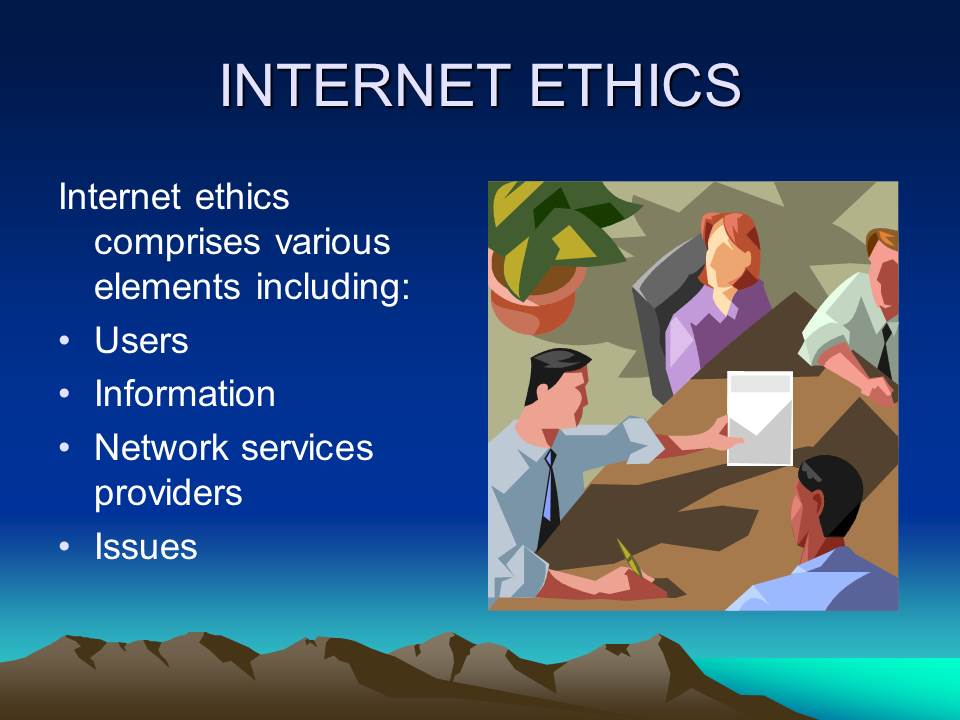
Internet Conduct
- Association of service providers;
- Agreement between the user and the service provider;
- Codes of conduct are informal codes;
- Minimum set of netiquette guidelines.
Relating to acceptable behavior on the internet there is no body or universal set of rules or laws regulating that, but this is mainly effected by association of service providers who come up with acceptable use policies, codes of conduct, and the implication of certain laws in relation to the users and the information (Kate and Robson , 1999). Acceptable use behaviors policies are generally contracts between the users and the internet service provider specifying what is acceptable or un acceptable in relation to the network services.
Codes of conduct are guidelines regulating on-line behavior that have developed gradually as the internet grows and are mostly developed over by the on-line or specific communities that why they are referred to as informal codes of internet use.
Various companies or groups adopt a minimum set of netiquette guidelines to regulate the conduct on their networks. Variety of guides on netiquette are found on the internet but one the most referred to is the ten commandments of Internet conduct from the Computer Ethics Institute by Rinaldi (n.d), which provide the following guidelines which many groups and companies have used to develop their own netiquette guidelines:
- Thou shalt not use a computer to harm other people.
- Thou shalt not interfere with other people’s computer work.
- Thou shalt not snoop around in other people’s files.
- Thou shalt not use a computer to steal.
- Thou shalt not use a computer to bear false witness.
- Thou shalt not use or copy software for which you have not paid.
- Thou shalt not use other people’s computer resources without authorization.
- Thou shalt not appropriate other people’s intellectual output.
- Thou shalt think about the social consequences of the program you write.
- Thou shalt use a computer in ways that show consideration and respect.
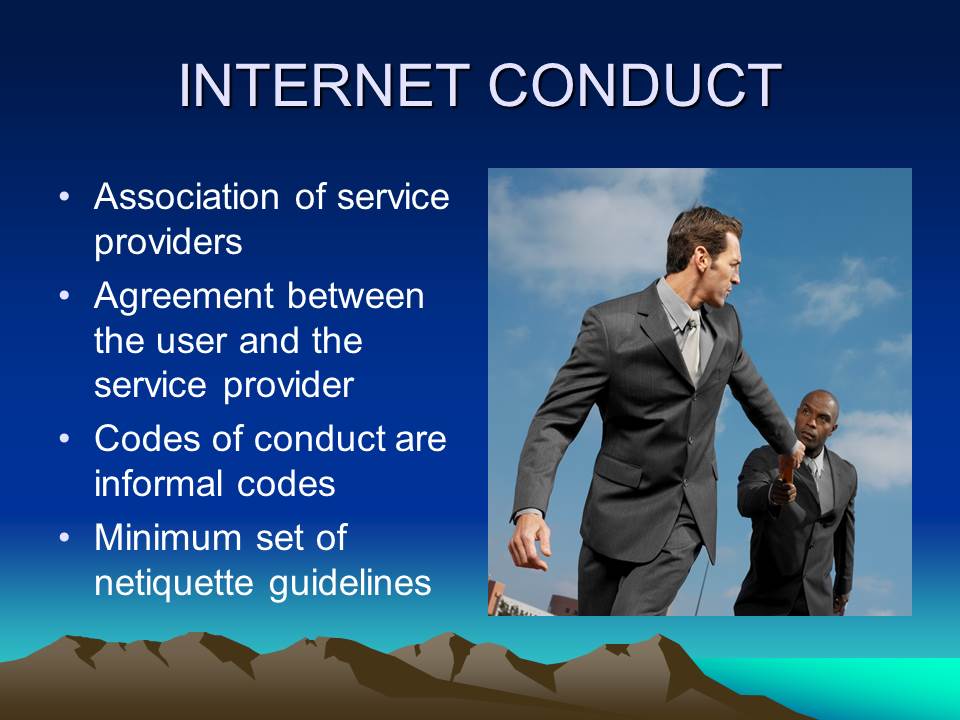
Ethics and Research on the Internet
- Social science research guidelines;
- Informed consent;
- Confidentiality;
- Dignity;
- Avoidance of harm.
Concerning research in the internet especially the social science research most of the internet ethics are structured to take into considerations the codes of conduct relating to the practice of social research and the codes of conduct that relate to behavior in on-line communities and groups. For example Major professional social science organizations, such as the American Sociological Association and the British Sociological Association have developed guidelines for social research.
Other disciplines also have their guidelines on doing internet research. Formulating guidelines for the considerations mainly relates to issues of privacy, informed consent, confidentiality, dignity, and avoidance of harm.
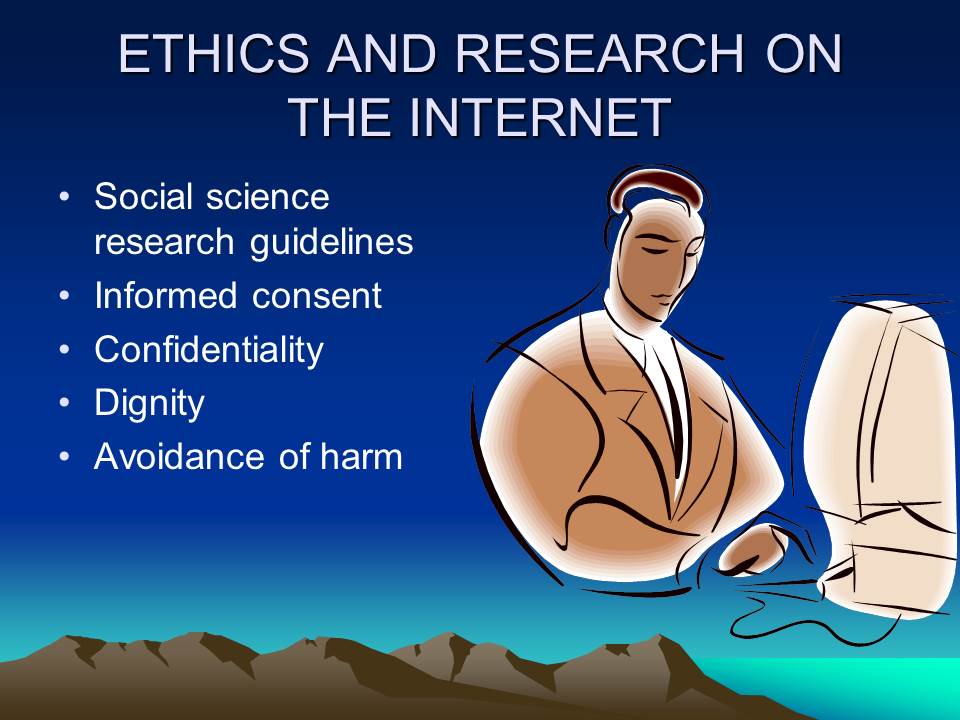
Ethics and Business on the Internet
- E-business;
- Privacy;
- Protection of data;
- Accountability;
- Freedom from invasiveness;
- Honesty and responsibility.
Emergency of e-business enabled by e-commerce has enabled conducting of business over the internet through trading platforms such as eBay and provision of financial services and transaction through the internet thus enhancing on-line business especially the retail type. For on-line businesses several issues relating to internet ethics arise including ‘honesty and responsibility, accountability, privacy and confidentiality, protection of data (i.e. credit card numbers), freedom from invasiveness (i.e. so-called sticky websites that automatically track and retain customer contact and information), quality of the goods delivered, disclosure and reliability of information (i.e. the scandal with fake paintings sold on eBay), sources of goods, Internet economics vs. traditional economics, impacts of global Internet business, employment through the net (local and global telecommuting), web advertising, competition on the Internet (hacking into data, falsification of data), public information and financial disclosure (investor relations on the Internet), and others.’ (WarsawUniversity, 2001).
One of major issues relating to on-line businesses is the issue of consumer privacy with regard to protection of their data and release of their personal information to third parties. To safeguard their customers majority of on-line businesses have a privacy notice on their web pages.
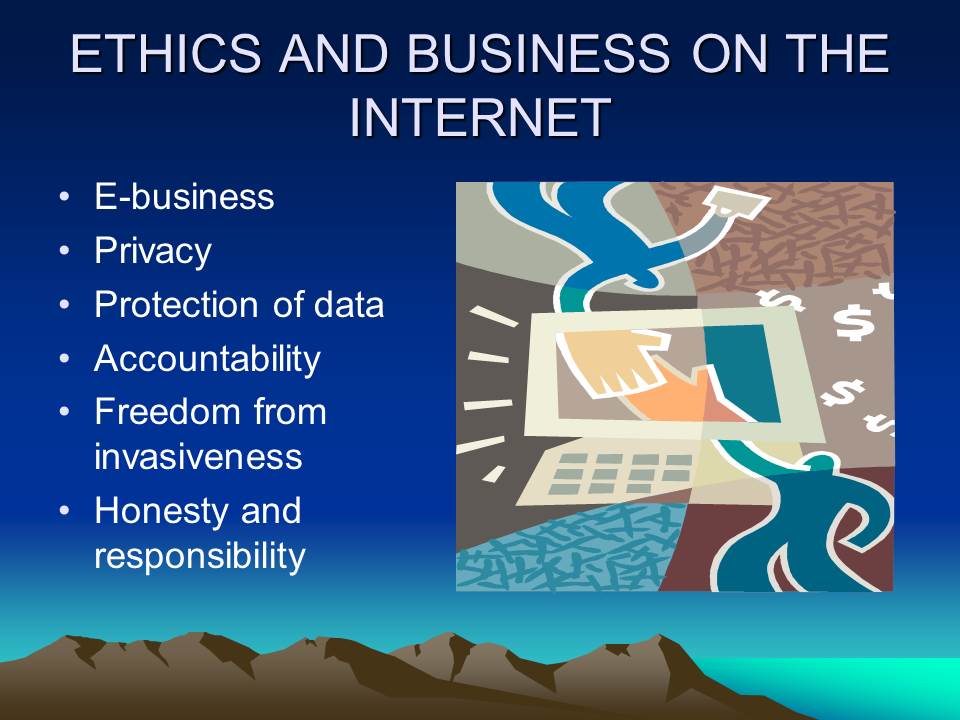
Ethics and Politics on the Internet
- Freedom and quality of assembly;
- Public information;
- Political parties;
- Quality of political participation enabled;
- Kind of information provided.
Internet ethics related to political issues mainly concern the impact of the world wide information network on the freedom and quality of assembly, deliberation, community information and decision making, and the type of civic/public participation enabled by the internet on political matters. Internet is a very valuable resource for all types of information including the public information and political information. Internet can serve as a communication link between the government, the public, and the political removing/reducing barriers encountered in these type of communications.
Political parties are using internet to post their manifestos, stand and view relating to public issues, and to open political participation to the public by responding to their issues through the internet for example by responding to public commentaries. Quality of political participation can be gauged depending on the quality and accessibility of the home pages, the depth of the information contained in the website. The kind of information provided can evaluated on the basis on the interactivity offered to visitors and the type of information contained ‘(text only, pictures, photos of candidates or leaders, pre-digested information or actual texts, depth and extent of analysis, further links, possibility of original interpretation of information and for developing independent and critical perspectives and points of view, the degree of personalization of information–the “party line” vs. candidates’ and politicians’ individual views and personal voices, not to mention the degree of social responsibility expressed or implied in all of above)’ (WarsawUniversity, 2001).
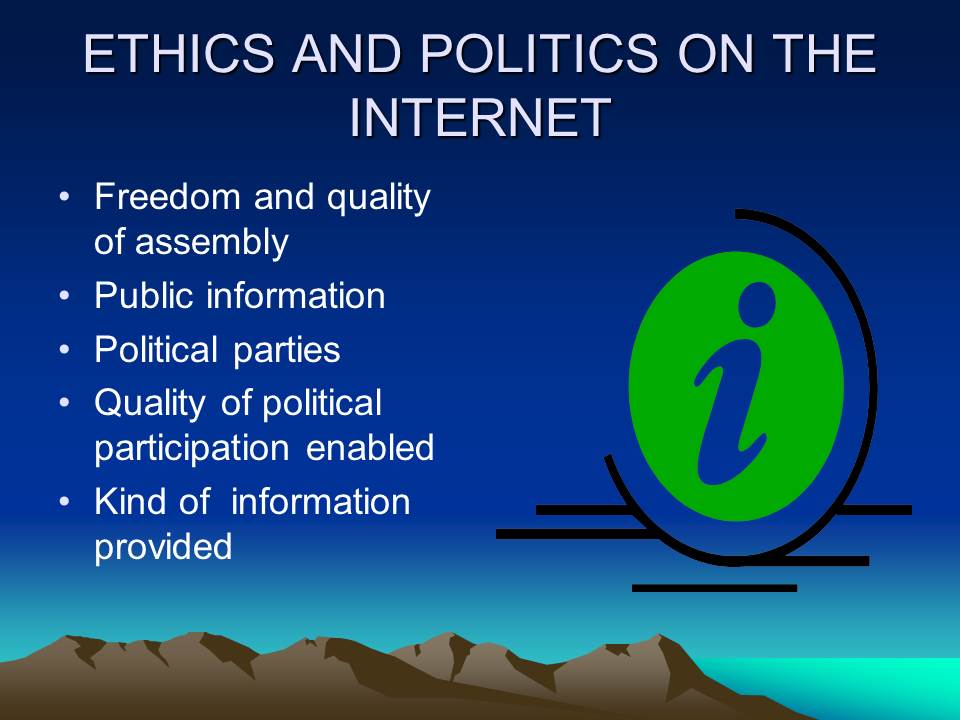
On-Line Education and Ethics
- Interactivity;
- Quality of educational experience;
- Impact on the nature of learning;
- Impact on the nature of teaching.
In using IT to offer on-line education, the standard of education should be well maintained or even be improved by taking the following considerations with regard to matters pertaining education and the internet: interactivity, quality of education experience being offered, impact on the nature of learning, impact on the nature of teaching, privacy and other aspects.
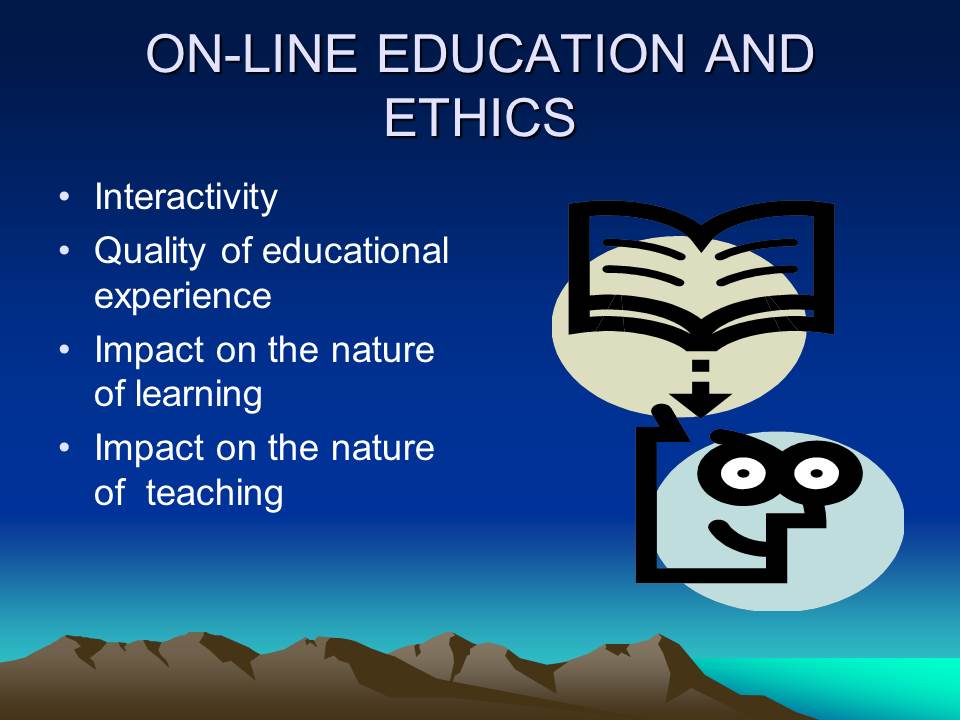
Legal Issues and Ethics
- Intellectual property;
- Privacy;
- Reliability;
- Internet crimes;
- Freedom of expression;
- Data protection.
Internet is legally recognized as a medium of communication, and electronic storage of information that why most website have privacy notices in respect of privacy and intellectual property of the information contained there in with emphasis to respect of intellectual property and privacy in the use of that information.
There are also legislations and laws governing user groups, companies and other internet users on matters relating to reliability, internet crimes, freedom of expression over the net, data security and other matters depending the country applicable or organization or the group.
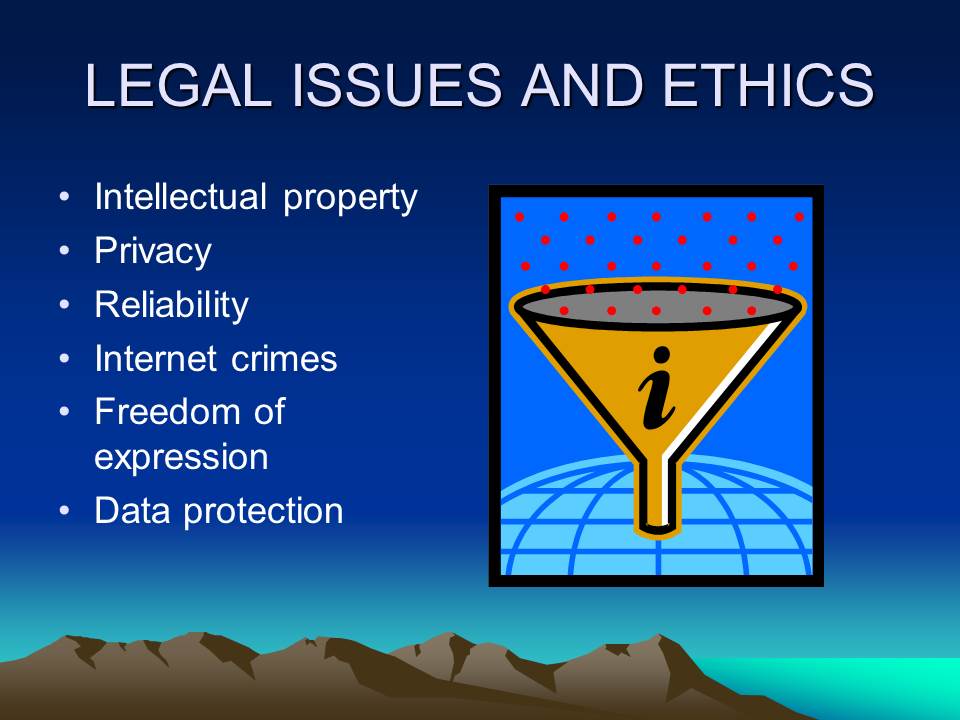
Conclusion
- Ethics issues and internet are ever expanding;
- Emerging frontiers.
Problem of ethics and internet are continuing to increase every day through internet use generating more specific issues and problems concerning internet use. This situation is mainly being by rapid advancement in internet technologies and the fast increasing global reach of the internet. Internet is generating all sorts of communication creating new frontiers for education, business, politics, social interactions and technological advancement in various fields.
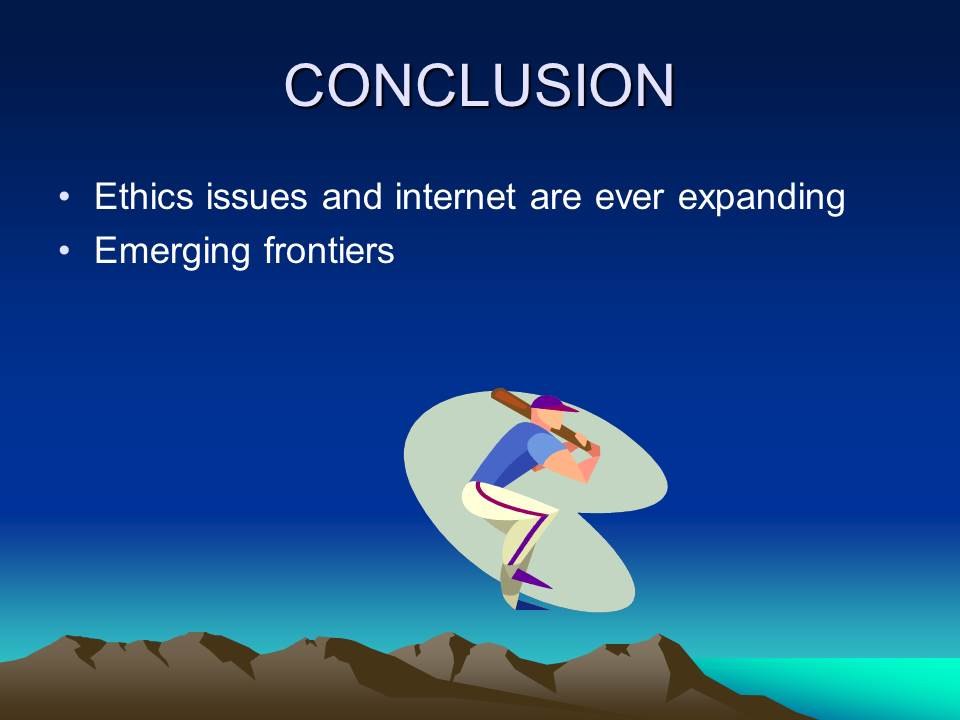
References
Kate, R. and Robson, M. (1999). Your Place or Mine? Ethics, the Researcher, and the Internet. In John Armitage and Joanne Roberts, eds. Proceedings of the conference Exploring Cyber Society: Social, Political, Economic, and Cultural Issues. London: University of Northumbria.
Rinaldi, A. H. (N.d). The Net User Guidelines and Netiquette. Web.
Stewart, J.M., Tittel, E. & Chapple, M. (2008). CISSP: Certified Information Systems Security Professional Study Guide. Ontario: John Wiley and Sons.